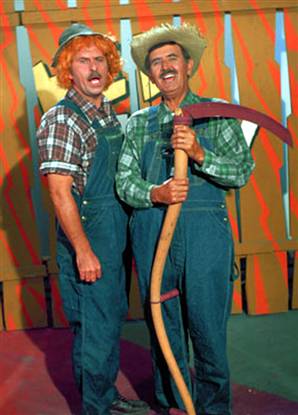


All right, enough is enough with the "pants on the ground" in Major League Baseball. While watching the Pirates battle the Los Angeles Dodgers this past Wednesday, I was anticipating Manny Ramirez getting the bottoms of his pant legs caught in his cleats and do a prat fall while going for a shallow fly ball in left field. Why did National and American Leagues ever let these guys quit wearing stirrups? In case you don't remember stirrups as part of a major leaguer's uniform, here is a guy you all probably remember who didn't think he was too good to wear stirrups with his uniform.

Come on, guys, get the pants off the ground. Just because they made you wear stirrups in the minors doesn't mean they don't make you look more like a baseball player once you make "The Show." Stirrups make your uniform look dignified, professional, and FINISHED. So, dig out those stirrups and let's get those "pants off the ground."
But if stirrups don't float your boats in the Major Leagues, you might want to check out these alternatives if you still think you are too cool for what Roberto Clemente was proud to wear, STIRRUPS.

|

|

|
The recent suicide death of Phoebe Prince after an alleged three months of psychological and physical bullying by nine students at Boston's South Hadley High School has prompted me to think about the notion of "popularity" in the high school sense of the word. Are some high school students who are considered "popular" actually well-liked by a majority of the students? Actually, the "popular kids" are probably not that well-liked, which is what being "popular" should mean. Many of the students charged with harassment, assault, and denial of Civil Rights, among other charges, are likely considered to be elite athletes and most likely make good grades; however, they probably caused more fear and dislike than popularity. What the nine students actually were is "notorious." All nine were well known by the student body. Most students knew who they were and knew them on sight, which makes the elite notorious, but not necessarily popular. The rest of the student body probably didn't think they were popular, but they probably were. Most students run in their own little groups of friends with whom they attend various school functions, participate in activities, and socialize with after school. Most students know that they can't pierce the "veil" that separates them from the students who are considered part of some kind of "elite," namely athletes, cheerleaders, and "cool" honor students who are acceptable in elite circles. The students outside the elites just didn't recognize that they were popular with their friends, and after them, what else is really necessary to survive high school?
These elite groups, or cliques, have notoriety, not general popularity. A person can be well-known (notorious) without being popular (well-liked). You can be both notorious and popular, but only if you are notable for having the kind of personality that is attractive to all. Most elites in high school are too exclusive, and sometimes abusive, to be considered truly "popular." To use a movie analogy, Ferris Bueller was both notorious and popular. As the principal's secretary told him, all the different groups and cliques loved Ferris, and considered him to be a "righteous dude." There aren't too many Ferris Buellers in reality.
What about the students who are not notorious? Well, most of them are popular within their small circle of friends with whom they share common interests. These students go about their time in school without doing much more than accepting the fact that the notorious elites are going to win most of the general accolades, but they are too busy enjoying themselves and their friends to care very much. They shrug and wait for graduation and that next step in their lives. They are probably healthier people, as they are not in danger of never being able to fully leave the cocoon that is their public high school. For some of the more elite students high school becomes the zenith of their life achievements, and many can't stay away from it, never growing beyond it. Going back for a class reunion, or having chance encounters with other students after graduation, they still try to pigeon-hole those who weren't in their circle of friends. The ability to grow and change was stunted in them, so they think those they excluded in high school have not changed, either, so they are still asking questions about things that happened thirty, forty, or fifty years ago as if no one can change since they can't. These poor souls don't see people, they see ancient caricatures and stereotypes. This is a kind of prison they have made for themselves, but to them it appears to perpetuate the years they must cling to in order to continue to live in the cocoon in which they enjoyed being "popular." They are missing more than they know.
These are two words that most people think are synonymous, honor and pride. We sometimes keep them separate in order to join them verbally with the conjunction "and," as in, "Where's your honor AND pride?" These two words get mixed up a lot by people. They are actually mirror images of each other, with their two sides turned around in the mirror's reflection. They are actually contradictions of each other. Pride is the ANTI-honor, or the antithesis of honor. To get these words straight in my mind, I tried Wikipedia's essays on both. The definition of honor that read the best, and most accurate, to me was Doctor Samuel Johnson's definition:
Now, Doctor Johnson could always turn a phrase, but I thought I better get a concise defiinition of magnanimity rather than define it how it is used in the definition of honor. Magnanimity is derived from the Latin roots magna, or great, and anima, or soul. To possess magnanimity is to possess "greatness of soul." It means "a refusal to be petty, a willingness to face danger, and taking actions to achieve a noble purpose." When I read this, I could only think, "That is what I want. I would sell all I have to be known as this kind of person."
If two words were ever synonymous, they aren't pride and honor, they are magnanimity and honor. Let's face it, the prideful see themselves as already being without any flaws. To be proud is to consider everything as being about ME. Honor means the willingness to sacrifice self for a higher good. It means having the integrity to admit a mistake, a wrong action, or a lapse in virtue, and the willingness to make amends. Pride most often leads to denial of such things, as to admit to them means the whole appraisal of self as already great is false. This is why pride is the antithesis of honor and a person's biggest block to achieving honor. To be of noble soul is to first see where you have fallen short of nobility. Pride blocks that ability to see the self honestly. The proud also can't willingly sacrifice as material things, and their own well-being, are too important to them as they define what they are. Their selves are too important to them.
In 2008, a local man of nineteen years old was awarded the Medal of Honor posthumously for his actions in Iraq. Private First Class Ross McGinnis of Knox, Pennsylvania, saw a grenade sail into the Humvee on which he was riding as turret gunner. He shouted a warning to the troops inside, then jumped from his turret, putting himself between the exploding grenade and his friends. Witnesses say PFC McGinnis could have easily saved himself by jumping off the Humvee. A Medal of Honor for an act of true honor.
I am 57 years old and have spent this entire time confusing pride with honor. You younger people can start now to avoid that mistake. I'll have to hustle to get there now. Be noble of soul. Refuse to be petty. Be willing to face danger and take action to help those who can't help themselves. Be a scorn of meanness. Fix yourself first. Maybe the world will follow.

No, I'm not writing about that weird horror story from the late 70s or early 80s. You know the one with the weird old guy who looked a little like that vampire suffering from blood lust angst on Dark Shadows. That title always made me think of Tricky Dick's Five O'Clock shadow during his debates with JFK in 1960. I'm talking about all of those images you have floating around in your head. You know the ones. Maybe it's a scene from Twilight when Kristen Stewart was in trouble and Robert Pattinson had to rescue her. Maybe it's Idgie Threadgoode throwing a birthday party for Ruth at the River Club. They are called images, and it's pretty hard to remember people, places, and things without them. You have tape recordings in your brain, too, like that weird commercial jingle you have stuck in your head.
Some of these images can stay pretty sharp for a long time because they conjure up memories of something pleasant from the past. Images can also bring back bad memories, and if they are bad enough you can have the same problem MSM's Doctor Cabe is trying to help Veronica Callahan solve on Mercy, Post Traumatic Stress Disorder. That's the bad side of storing images in your brain, which is something you do automatically. You can't stop it, but it's a good idea to watch what kind of images you store up there because they become part of you. Ask any war veteran.
You don't always take images in and recall them, but you also make images of your own inside your mind. Those images get stored in your brain, too, like when Jayce Bartok wrote The Cake Eaters. Mr. Bartok visualized the characters, and what they did, in his mind, put them on paper with his screenplay, then had MSM's gang shoot it for him. That's why it is called imagination. Humans conjure images of things that didn't actually happen. It is called fiction. We won't get into what is real and exists. That would take too long. What Mr. Bartok wanted MSM to do is put on film what was already in his mind, The Cake Eaters, and she did it. You have motion pictures stored up there, too. They stick around for awhile, then, like an overviewed VHS tape, they kind of get washed out until you can't bring them back again. Humans make motion pictures all the time. That is how we experience things as everything is outside of our being. Our senses bring it inside, such as the sense of sight. Our eyes take pictures of the people we know and encounter. These images move up the optic nerve--upside down, by the way. Your brain turns the image right side up after it gets there. So, you don't exactly see people. You take their pictures with your eyes, that have their own lenses, just like a still or motion picture camera. The people stay where they always are: outside of your immediate space and independent. They do not need you to exist, although Kristen Stewart's character in The Cake Eaters needed Jayce Bartok and Kristen Stewart to make her real.
Our cameras imitate what the eye does by capturing images. When we invented the camera, we used our intelligence to copy what the eye does, and the motion picture camera enables us to take moving pictures of what we can conjure in our imaginations. That makes you kind of wonder something. If it took human intelligence to copy what the eye does by inventing the camera, wouldn't it take an intelligence to make an eye? The law of proportionate causality tells us that an intelligence would have to be responsible. It would have to be an intelligence higher than the human intelligence as human intelligence couldn't exist without it. It took human intelligence to make a device that imitates what the eye does, so it would have to take a higher intelligence than the human to produce the eye. It would be a SUPER-human intelligence.
And we call this Superhuman intelligence "God." Making cameras and making movies; taking pictures and painting them; we think God's thoughts after Him.

In September 1998, about six months after this site first went up on the Internet, I attended a training session at a location right near the White House in Washington, DC. A couple of us stayed in a hotel on Dupont Circle and walked down to the White House area every morning. During a training break, I bought a cellophane package of honey roasted peanuts, and went outside to look at the White House and the First Infantry Division Memorial. I got interrupted by three squirrels running around some trees and shrubs in front of the building. One of them, the only female, was a black squirrel. Only about one in ten thousand North American squirrels have black coats. The two males were red squirrels. I fed them some of my peanuts, and fed them some more during the afternoon break. After about two days of this, one morning I was about a block from the facility when I spotted the black squirrel in the grass, standing on her back legs looking in my direction. She went back down on all four paws and stayed still until I drew up to her. She followed alongside me in the grass as I walked the sidewalk, and was soon joined by the two red squirrels. After I went into the facility's snack bar, and came out opening a cellophane package of honey roasted peanuts, the three little animals were lined up on the wall waiting. It was then that I named them "Manny, Moe, and Jackie." They were neighbors of the Clintons across the way in the White House.
The bushy-tailed little rodents taught me something about the intelligence of animals. It isn't like human intelligence, but it is not as simple an intelligence as many of us have been taught. These three squirrels learned to recognize an individual member of another species; quickly understood the other creature was a soft-touch for food, learned from which direction I would be coming every morning, and knew that the humans liked seeing them line up on the wall as that was when they got the most peanuts.
Animals are not as "dumb" as some people think. Their intelligence might be different, but it's a lot sharper than we realize.
Taking a break out in the parking lot of a client in downtown Coudersport, Pennsylvania in early September 2005, I noticed a monarch butterfly flutter past me, followed by another, then two more. They were all heading in the same direction. Looking to my left, which was basically Northeast, I saw two more approaching the parking lot, going in the same direction as all the others. I wondered about this, and looked for more at quitting time that evening. More of the butterflies floated through the parking lot as I prepared to return to my hotel a few miles west on US Route 6, the Grand Army of the Republic Highway that runs from Cape Cod to San Francisco. After returning to the hotel, I Googled "Monarch Butterflies, Migration" and came up with a map of the estimated migratory path and an article about the timing. Sure enough, Coudersport could easily be on the path. Stepping outside, I observed even more of the butterflies, all moving south-by-west, between two large pine trees at the edge of the hotel's property. The Monarchs were migrating to Mexico as winter approached. The article stated that a lot of the creatures get killed by cars as they fly over roads, and when we walked to a nearby restaurant the next evening, we saw some of those that would not make it to Mexico.
Not long ago, I told this story of the Monarch migration to a Mexican-American gentleman while waiting in a check-out line. He told me that he had visited relatives in Mexico who live near where the butterflies winter, and they were having a hard time this year with the colder weather in Northern Mexico. As tough as the Monarchs seem to be with the life cycle with which they have to deal, I have to think they might just surprise us.

I had to travel to Alexandria, Virginia many times for continuing training. Right across the square from the hotel where we met, the Embassy Suites, was Stella's, an upscale tavern with fine food and service. I usually went there for lunch breaks, and after a couple of years of this, the staff treated me almost like a regular as we had about two schools there each year back in the old days. The one lunch I remember most was when I was reading the USA Today while finishing lunch, and found a short article that I had to share with the hostess and my waitress while preparing to leave. Some moron took his wife out to dinner for their anniversary at HOOTERS. The two young women huddled over the paper, scanning the article, and you could see when they hit the part about the restaurant where the anniversary dinner took place. "Hooters!?" my Latina waitress was incredulous. "I would kill him," the blonde hostess added.
A petite woman was the senior waitress at Stella's, and she had the job as den mother for the Russian waiters who worked the lunch shift in the dining room. I usually sat at the bar for lunch. The Russians paid close attention to the senior waitress, as I learned when one was walking by as I was conversing with the senior waitress while getting ready to leave. As I said goodbye to the senior waitress, the Russian said goodbye to me in his native language, which went something like, "Das Vidonia." To which I replied, "Maria Sharapova to you, too." Americans should try to learn more foreign languages, but we don't.
Anyway, Stella's isn't around anymore. Some other place has taken the location over, and I haven't tried it yet. It's always sad to see the good places go away, but you never quite forget them.
After transferring to a different assignment for my employer, I haven't had much contact with any members of the crews with whom I used to work. My assignments are more one-person jobs, so I rarely work on a crew anymore. This week, we were all issued new laptop computers loaded with Windows 7. About six of us crammed into a small conference room in the Pittsburgh office to get a little introduction to the new computers. There was "Shrinkwrap Bob," who got his nickname for the time back in '95 when we went through the "downsizing" fad. About seven people were laid off, and Bob was one of the victims. When he turned in one of his manuals, issued a year or more before, it was still in the shrinkwrap, which irritated the boss who laid him off. That's how Bob got the nickname "Shrinkwrap." Fortunately, Bob got called back. "Shrinkwrap's" best friend, "Mr. Keith" was along, as was "Lukey Boy." As I looked around the table getting reacquainted, I thought to myself, "Jeez Louise, we really look OLD." I've known most of them since at least 1990, so I guess we are old. Back when a young woman named Jackie, who I called "Jackson," was working with us, I used to refer to events as happening so many years "BJ," for "Before Jackie," or "AJ," "After Jackie," who was born in 1980, so we are getting up there in years.
To top it all off, the guy who runs the Pittsburgh office now had his birthday when we were there. I asked him if one of the former bosses sent him a card or something. "No, I haven't heard anything from him. He sort of disappeared, like magic or something." What a magic act that would have been. The magician takes the stage and announces dramatically, "Ladies and Gentleman, in approximately thirty five years, I will make myself disappear."
I would want my ticket money back.
Around Christmas, I wrote on the FYI page about seeing Horton Foote's To Kill a Mockingbird on cable television over the Christmas holidays, noting that such films and novels can have lasting effects on a person's view of the world and their place in it. Well, just this week, I watched a young girl's 17-minute short film about a small piece of the life of a young urban African-American, named Tommy, as he tries to graduate from high school, help raise his younger sisters, and win a scholarship to college. His past, brief involvement in street gang life, left behind in order to help his sisters and to make a real life for them and himself, comes back to threaten his chance at college. An old friend of Tommy's from his street life guilt trips Tommy into helping him pull off a breaking and entry job the night before his interview for his scholarship. At the last minute, Tommy refuses, but still gets arrested. When his mentor gets him out of jail to take Tommy to his scholarship interview, he explains to the interviewer that he is still trying to finish becoming an adult, that he almost made a mistake the previous night, and might make more, but will not make the same mistake twice. Tommy describes himself as being chronologically a man, but actually still working his way to becoming one in fact, but he assured the interviewer that he will not give up on his journey to maturity. I won't tell if the speech worked in getting Tommy his scholarship, but the writer, Earlaina Kemp, still a student at Martin Luther King High School in Cleveland, revealed a wisdom that is beyond the majority of those her age. Ms. Kemp realizes as a teenager that an individual might be conducting himself in a way most people would not find acceptable at one point in his life, but might not be the same way sometime in the future. It is a mistake to base our entire impression of a person by the way they act during ONE point in time. Earlaina Kemp, a teenager, has discovered that most of us are "works in progress." We can be better tomorrow than we are today, or maybe we won't be better, but the potential to become better than we are is always there.
This is a problem of what metaphysicians would call "teleology," or how time affects our understanding of reality. Human beings exist in time and space. We are not omniscient, or omnipresent, so we can't view a person's entire life as an unbroken continuum. We only see little snippets, and most of what the people we know is under the surface, hidden by the limitations of space (we can't see every event of their lives) and time (the ability to change). We are all works in progress, with the emphasis on works, always remembering that perfection is something we can only approach, but that none of us can actually attain. In the end, what is important is how we make the journey, and how we respond to the watershed events we encounter in the journey.
Well, it is happening again. The Weather Channel is warning about 15-25 inches of the white stuff here, just in time to keep me in my latest hotel and cost me a weekend at home. That's the way it goes in winter and you make your living sort of like George Clooney in Up In the Air, except I don't fly and I don't fire people from their jobs. I drive, and the roads are terrible, and will stay terrible, into the time it would be worthwhile to drive 300 miles to get home for a few hours. It's the Jet Stream in a path that takes it down into the Mid-West to the Texas Panhandle, then bends a little north to southern Virginia after which it hugs the Atlantic coast. We get all Canada's weather this way as the Jet Stream is too far south to block it from coming down while allowing warm air to come north. By running close to the Atlantic coast, the storms moving west to east get stuck and start running north up the Atlantic coast of the US, pumping in ocean moisture that turns to snow in the form of "Nor-Easter" storms. "Every-Weekenders" would be a better name for them.
There are physicists who believe that time is some kind of illusion. I don't quite understand where they get this idea. The notion that the solid objects we encounter, and our own bodies, are made of matter that really isn't substantial, is a little more understandable given the invisibility of atoms, but the stuff about time being a sort of illusion is a bit harder to swallow. Einstein actually described one of time's properties, relativity, as he theorized, and it is kind of hard to develop a theory about something if it either doesn't exist, or is an illusion. In fact, just calling something an "illusion" is tantamount to saying it exists, but modern physicists don't pay much mind to what metaphysicians think, especially amateur ones.
I know time exists because I have watched so many people grow and change. This happened, of course, over time. My friend Mary's twin daughters were very young when I first moved here in 1989. Today, they are college graduates, with established careers, one with a local newspaper and the other a chemist, wives and one a mother. They have changed a great deal in the last twenty-one years, and I once warned them college goes by fast. Friends who were fixtures in my life for years are no longer here. Clytie is in Illinois, her children are all grown, and some have made her a grandmother. Holly, Becky, and Glynnis, who were students when I met them at Monarch Park Coffee Shop in 1997, are also gone, their adult lives taking them far from here. The coffee shop is closed, too. My friend Deb's daughter is almost ready to start school, and I can remember when Deb was pregnant like it was last week. My friend Buffy's daughter, Caitlyn, born with great celebration, is a teenager.
Yesterday, I was fly casting in French Creek just outside Phoenixville in Chester County, and now I'm over 300 miles from there. Sue, one of my landpersons when I rented an apartment in Royersford, is retired as a teacher and athletic coach of her local high school.
If` there is one way to know that time is real, besides the fact that we couldn't converse or theorize about it if it wasn't real, it is the people who have run through our lives like the flowing waters of a river, going on to other places. That is an infallible sign that time is real, and it exists. Whether we like all of its effects or not, there is no escaping it. We can't even theorize it away.
There's been a rash of Jane Austen's novels made into television movies and mini-series on lately. I caught Emma, the one Jane Austen novel I have in my library, on a PBS station in the Philadelphia area this week, and a few weeks earlier I watched Keira Knightly in a movie version of Pride and Prejudice. Now, this woman wrote in the Eighteenth and Nineteenth Centuries and in her pages she is creating female characters who openly express themselves, within the rules of etiquette of the time, with both men and women, and did so with a measure of wit and even some sarcasm. In 21st Century slang, the chicks were "snarky." Well, I decided to find out just how much of this came from Miss Jane herself, and found an Austen fan's large site that includes some quotes from Jane Austen's personal letters. If she was alive today, Jane Austen could solve NBC's problems with a Tonight Show host, or in this case, hostess. Here are some of my personal favorites from the pen of the snarky Miss Austen:
It's pouring down the snow again, but this time I made it home. That's one for me over Old Man Winter. As pointed out in some other sections of the Webmaster's Back Office, I lived next door to a Trigonometry teacher when living in Greensburg, Pennsylvania in 1977-1979. Her first name was Gloria. Well, here at Crestview Apartments in Oil City, Pennsylvania, I'm living next door to a math and trigonometry teacher again. This time her name is Jessica. We sign for each other's UPS packages when the other isn't home, and I saved a copy of her Bridal Magazine from being crushed and dogeared in the overflow bin of the apartment mailboxes. She's getting married pretty soon. Anyway, after living next door to two female math teachers, I decided to brush up a little as I only made a B- average in Algebra II in high school. I picked up Danica McKellar's book Kiss My Math, and showed it to Jessica, promising to give it to her when done brushing up on integers and variables. Maybe I can do a little better than B- since I'll probably have another math teacher living next door in the future. It seems to be a trend.
It happened again this winter. I'm snowed in for a weekend, far from home. There was a window for me to get home, but the final meeting for this job assignment is this coming Monday, so I had to make sure to be able to get to the meeting. So, here I am 342 miles from home, taking cover from the biggest blizzard of the winter in Southeastern Pennsylvania. This is nothing new, and I have decent digs for the next couple of days, so it isn't really a problem. By the time I'll get to go home again, the roads should be good enough for safe travel. This happens every winter, and there really isn't that much of winter left. I'm doing this update with dial-up since the weather, or something else, is preventing use of hotel wireless. Oh, well, it still works! Packed a few extras, just in case, but didn't bring a couple of candles and an extra external wireless antenna. I'll remember them when my travels take me to the next snow belt. There are scattered power outages in this storm, but where I am has gotten by without one--yet.
We hear it a lot, in various formats: "I want my life back." "I was just trying to get my life back." whether on a television show, in a novel, or in a movie. Someone is talking about getting their lives back after some tragedy, disaster, disappointment, or trauma. I wrote to a couple of relatives and friends about this not long ago, and had to tell them that this whole "getting my life back again" is just not possible. What we all get after something really disruptive or bad happens is "something else," something different, not life the way it was before whatever fell on us. Now, the "something else" doesn't have to be something bad. It can be, but it doesn't have to be. "Something else" can be better, or just as good, as what came before. It doesn't have to be worse than what came before. I think there was a line toward the end of The Florentine about the important thing being how we play the hands we are dealt in life, rather than what kind of hand we are dealt. That is the best approach to take when the "bad stuff" is over, and I haven't seen bad stuff that didn't eventually end. When something unpleasant is happening, don't think about "getting my life back." That won't be the same, anyway. Just deal with the crisis, learn from it, and get on with life the way it is after the crisis has probably altered it in some way. If we are busy wishing nothing had knocked us out of a comfort zone, which is probably the term that should replace the word life in the cliche' we're talking about ("I want my comfort zone back."), we can't concentrate on resolving the crisis, or coping with it. We also can't learn anything from it, either.
Our lives change for various reasons. They change all the time. People move into our lives and leave them. Bad things happen and we get over them. All of them change our lives, making them different than they were before. So, there is no "getting my life back again" for any of us. We get something different and build on that. The sum total of it all constitutes the stories of our lives.
Animal Planet is not a channel I've tuned into lately. It hasn't been that interesting, but the channel caught my attention when it ran the video of a man in a wooly mascot's costume get the thumping of his life by a 200 pound Red Kangaroo named "Rags." Rags started out just affectionately hanging on to the man who raised him, but the video showed "Marty the Monster" brush up close to Rags. While I watched it, the man inside the foam rubber mascot costume appeared to work the costume's hands in a circular motion like "Marty" wanted to box the kangaroo. The animal obliged the weird, toothy looking mascot, punching first, then seizing the costumed human around his chest, dragging him to the ground. The audience thought it was part of the performance. Right, a kangaroo chewing on the foam rubber head of an expensive mascot costume was just what the Australian TV channel planned. The kangaroo looked like it was gnawing on a turnip. No one could seem to stop the kangaroo until his owner calmed Rags down, managing to pull him off the mascot. The kangaroo then started beating on his owner for awhile. "Marty the Monster" tried to distract the beast with a piece of bread, but the kangaroo flattened the luckless mascot with one left jab. The mascot didn't get back up for awhile.
As one poster put it on the Internet: "After watching this video, not getting my ass kicked by a kangaroo has made the top 50 priorities in my life."
Mine, too.
A good friend and co-worker named Patty sent a plant in a basket to my mother's funeral showing last March. I've kept the plant ever since, but this winter has been hard on it while leaving it on its own in my apartment while working maybe 300 miles away that week. Some of the leaves started curling up, turning black or brown, despite getting sufficient water. The soil was usually moist, and the plant doesn't need copious water. I decided the plant wasn't getting enough light, so I put it under some lamps with "plant light bulbs" installed. After about 24 hours of constant light, some of the blackened leaves started to turn back to green. The plant wasn't getting enough light. Some of the leafy stems seemed to grow more, stretching toward the light source. The plant has a chance to survive the winter now.
After Mass today, I ran into my friend Mary, who commented about how sad she was about the tragic death by gunfire of Pennsylvania State Trooper Paul Richey. Trooper Richey was shot while answering a domestic violence report in Cranberry Township, about six miles away from where I am writing this. Paul Richey left behind a wife and children, and he was only 40 years old. The man who shot him also took his own life, after killing his wife. Why did the man kill Trooper Richey? Because he didn't stop to think that Paul Richey was a man with a family he cared about, and who cared about him. He couldn't get past his own emotions to think that he would be punishing people who did nothing to him. Perhaps if the man knew Paul Richey and his family, he would have just committed suicide, killing no one else, or just surrendered, which would have been more rational and just. Instead, he took the lives of others as well as himself. Why, people wonder.
Sometimes, we don't have enough light, or don't use the light we have.
Every once in awhile, some foolish youngster is surprised to find out there were some tough recessions out there before this one. When 20% interest and 20% unemployment hit in 1980-81, that was a nasty recession. Once the 20-somethings find out you lived through three or four of the things, they want to know what a recessionary job market is like. Well, it's tough. It's a fight to get a job, then a fight to hold it from other scared people, along with various sneaks and bullies looking for an edge in the "rat race." Sometimes, it is best to just let pictures do the talking. Anyway, don't worry, "kids," all the recessions I lived through went away. Hopefully, this one will, too.

In May 1982, PBS Television brought a BBC miniseries to the United States called Oppenheimer, the story of how J. Robert Oppenheimer directed the Manhattan Project during World War II, resulting in the production of the first atomic bomb. Oppenheimer was an interesting figure in American history, and actor Sam Waterston turned in an excellent performance showing the complexity in Oppenheimer's personality and world view. Oppenheimer, a physicist at the University of California at Berkely, was appraised by U.S. Army General Leslie Groves, of the Corps of Engineers (Groves built the Pentagon) as the right man for the job of keeping a diverse group of scientists focused toward producing the bomb, which was frequently referred to as "the Gadget" at the Los Alamos, New Mexico facility where Oppenheimer ran the research team. Oppenheimer was more than a physicist, but a kind of Renaissance Man who could read Sanskrit, was well read in poetry, and held to leftist opinons in response to the suffering of the Great Depression. When the bomb was successfully detonated, Oppenheimer quoted from the Bhagavad-Gita: "I am become death, the destroyer of worlds."
Oppenheimer's extramarital relationship with Jean Tatlock, allegedly a member of the Communist Party, was a source of security concerns for General Groves, along with Oppenheimer's past leftist affiliations. With the end of World War II, and the success of the Manhattan Project, Oppenheimer continued to lead the US atomic research effort, although he clashed with fellow physicist Edward Teller about the need, or the desirability, of producing a hydrogen bomb ("The Super"). In the wake of Soviet spy rings being detected in several departments of the government, the subject of Oppenheimer's past leftist affiliations became a controversy, and his security clearance was revoked.
The BBC has made Oppenheimer available on DVD. I remember the series from the time I spent in the Graduate Business Department at Clarion University of Pennsylvania in the early 80s.
There are a variety of responses to a tight job market, and having gone through one shortly after graduating college in 1974, I remember a lot of them. Here is a quick list to consider as you ponder your next move.
7. While you are working some job you never intended to do, but it pays the rent and other essentials, try to focus on contentment through small pleasures. To me, a cheap afternoon matinee, Big Band music on the radio, Pirate and Steeler games, and the company of friends and family made me realize that I had plenty for which to be thankful no matter what job I had. So, while you are in some temporary gig somewhere, go out for breakfast on Saturday. Call a friend or two and have a picnic lunch. Go for a walk in the park, or to a high school football game. You don't have that dream job, but life can still be good.
